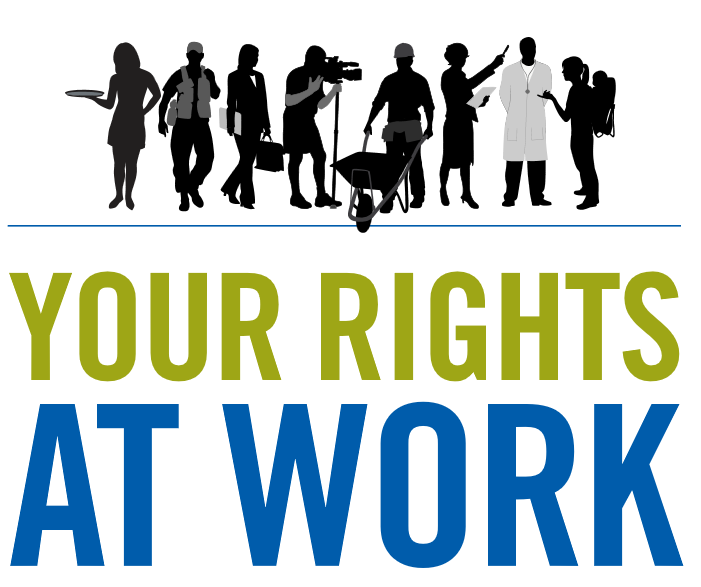
Since Donald Trump won the election, nearly 900 incidents of violence, hate speech and harassment have been reported. In light of these attacks, it's important that you know what your rights are and what you can do if you or someone you know is the target of one of these attacks in the workplace. Click on the links to learn more about your rights, what constitutes illegal activity and what you can do about it if you are targeted.
Disability: The Americans with Disabilities Act requires employers to make reasonable accommodations to enable an otherwise qualified person with a disability to do his or her job. A reasonable accommodation is any change in the work environment (or in the way things are usually done) to help an individual with a disability apply for a job or perform the duties of a job. An employer does not have to provide a reasonable accommodation if it imposes an “undue hardship” on the employer. An employer is not required to lower quality or production standards to make an accommodation.
Gender Discrimination: No one should be typecast into—or out of—a job or profession because of gender. Gender discrimination involves treating someone (an applicant or employee) unfavorably because of the person’s gender. The law forbids discrimination in all aspects of employment, including hiring, firing, job assignments, layoff, training, fringe benefits and any other term or condition of employment. An employment policy or practice that applies to everyone, irrespective of gender, can be illegal if it has a negative impact on the employment of people of a certain gender and is not job related or necessary to the operation of the business.
Race and Ethnicity: Racial discrimination involves treating someone unfavorably because of the person’s race or personal characteristics associated with race. The law forbids discrimination in any aspect of employment, including hiring, firing, pay and benefits. It is also unlawful to harass a person because of that person’s race. Although an employer may implement a policy that applies to everyone regardless of race or color, the policy can still be unlawful if it has a negative impact on the employment of people of a particular race or color, is not related to the job and necessary to the operation of the business.
The law prohibits discrimination against an employee or applicant because of that individual’s national origin. Whether an employee is Filipino, Turkish, American Indian, Colombian or Ukrainian or any other nationality, he or she is entitled to the same employment opportunities as anyone else. No individuals can be denied equal employment opportunity because of birthplace, ancestry, culture, linguistic characteristics common to a specific ethnic group, or accent.
Religion: Religious freedom is one of the principles on which America was founded and one of the basic rights we value most. Religious discrimination involves treating a person unfavorably because of his or her religious beliefs.
Title VII of the Civil Rights Act of 1964 prohibits employers from discriminating against workers on the basis of religion in hiring and other conditions of employment. The law requires an employer to reasonably accommodate an employee’s religious beliefs or practices, unless doing so would cause an undue hardship on the employer.
Sexual Harassment: Sexual harassment is unwanted verbal or physical conduct of a sexual nature when:
- You must submit to the behavior to keep your job or to get a promotion, a good job assignment or some other job benefit; or
- The behavior unreasonably interferes with your work performance or creates an intimidating, hostile or offensive working environment.
Examples of sexual harassment include pressure for sexual favors; pornographic material left on your desk or work area; touching, "goosing," patting, hugging; leaning against; leering, whistling, catcalls or howling; using demeaning terms such as "sweetheart," babe" or "honey"; sexual teasing and jokes; posting cartoons, posters or drawings of a sexual or insulting nature; asking personal questions, telling lies or spreading rumors about your social or sex life; making sexual remarks or gestures; and actual or attempted sexual assault.
Sexual and Gender Identity: Only 21 states and the District of Columbia have laws that ban discrimination in the workplace because of a person's sexual identity. Only 17 of those states and the District of Columbia ban discrimination in the workplace because of a person’s gender identity, while two other states, Delaware and New York, ban discrimination in public workplaces because of a person's gender identity. Because there is no federal law prohibiting employment discrimination on the basis of sexual identity, working people in 28 states are being denied employment on the basis of something that has no relationship to their ability to perform their work.
The states with laws that prohibit workplace discrimination on the basis of sexual identity are California, Colorado, Connecticut, Delaware, the District of Columbia, Hawaii, Illinois, Iowa, Maine, Maryland, Massachusetts, Minnesota, Nevada, New Hampshire, New Jersey, New Mexico, New York, Oregon, Rhode Island, Vermont, Washington State and Wisconsin. Several cities have laws banning workplace discrimination because of sexual identity.
Learn more about your workplace rights in these and other areas.

